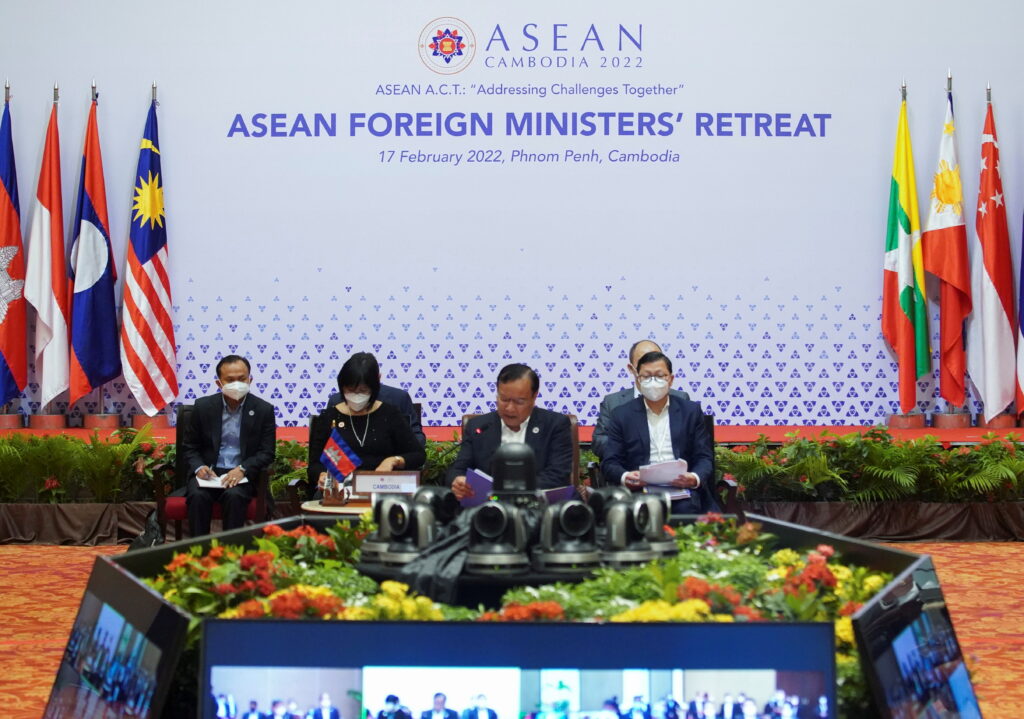On 7 May 2024, former Cambodian prime minister Hun Sen held a video conference with Myanmar’s military junta chief, Min Aung Hlaing. According to a readout of their conversation posted on Hun Sen’s social media accounts, he requested to meet virtually with Aung San Suu Kyi — a request that was reportedly refused by Min Aung Hlaing.
The former Cambodian prime minister then went on to highlight the importance of the ASEAN-backed Five-Point Consensus and lauded Myanmar’s military government for sending its non-political representative to ASEAN high-level meetings.
Cambodia does not have any serious obligations regarding the situation in Myanmar, unlike in 2022 when it was ASEAN Chair. But Hun Sen’s interest in Myanmar has not subsided.
One of his high-profile engagements with the issue was seen in October 2023, when he received the President of the Nippon Foundation, Yohei Sasakawa and the two men vowed to visit Naypyidaw together. That plan has not materialised, but Sasakwa did visit Myanmar in November 2023 without Hun Sen.
These engagements have happened even though Cambodia is not directly affected by the crisis. Unlike Thailand and Laos, Cambodia does not share a direct border with Myanmar. Even though he is no longer the prime minister, having been succeeded by his son Hun Manet in August 2023, no one can dispute the influence he has on the Cambodian government. He is still the president of the ruling Cambodian People’s Party and is influential in shaping state affairs including foreign policy. Any external issues that receive his personal attention are considered top agendas for Cambodia’s foreign policy. His meeting with Min Aung Hlaing solidified the status of the Myanmar crisis as a top foreign policy issue for Cambodia.
Hun Sen wants to showcase that Cambodia — once a war-torn and conflict-ridden country — can contribute to finding a durable resolution to help Myanmar out of its crisis. Helping solve the Myanmar crisis would increase Cambodia’s regional and international standing as a peacemaking country, a legacy that Hun Sen wants to cement. This feeling of needing to leave a positive legacy is deeply grounded in the way that leaders in Southeast Asia think. Hun Sen is no exception.
Since the coup in February 2021, Hun Sen has been personally invested in helping return Myanmar to normalcy. Hun Sen’s body language and storytelling of Cambodia’s experiences of war and peace were reported to have helped convince Min Aung Hlaing to agree to the ASEAN Five-Point Consensus in April 2021. As 2022 ASEAN Chair, he made the bold decision to personally visit Myanmar and try to find a peaceful solution despite disagreement among ASEAN members. While these efforts faced setbacks, Hun Sen should be given credit for his attempts to resolve the crisis.
Now no longer the prime minister, Hun Sen’s continued interest in Myanmar should surprise no one. Currently heading the Cambodia Senate, he has more room to manoeuvre. He can travel around the region or even visit Myanmar more frequently to meet stakeholders to test ideas, as well as make proposals without determining state policy per se.
Hun Sen can always say that his involvement in the Myanmar crisis is within his own personal capacity, avoiding entirely the question of lending legitimacy to any of Myanmar’s political groups. He also has a strong foreign affairs team to support him. Key figures in the Cambodian foreign ministry with deep institutional memory and experience on foreign policy, relations with ASEAN and the Myanmar crisis are all now serving in the Senate, including former foreign minister Prak Sokhonn, former permanent secretary of state Ouch Borith and former secretary of state Chem Widhya.
ASEAN should treat Cambodia’s keen interest in Myanmar as a welcome sign because the regional bloc now has an attentive constituent investing its efforts to trying to find solutions to the crisis. This reinvigorated interest from Cambodia has come at a time when there is a general feeling of fatigue in ASEAN on addressing the situation in Myanmar given frustrations from the lack of progress and apparent impossibility of operationalising the Five-Point Consensus.
Regardless of its success, should Hun Sen’s continued interest in the Myanmar crisis manage to make any breakthrough, no matter how small, ASEAN would gain from this breaking of the current impasse. Should he not succeed in this effort, he deserves at least some credit for his attempts.
Him Rotha is Deputy Director at the Cambodian Center for Regional Studies.


Cambodia is keen to offer help in resolving the Myanmar crisis, in large part because of Hun Sen. The former prime minister’s continued personal involvement in the situation in Myanmar has kept the crisis on Cambodia’s foreign policy agenda. Amid a general sense of fatigue in ASEAN regarding the situation in Myanmar, having a keen constituent like Cambodia pushing for a way out of the crisis is good for the region as a whole.